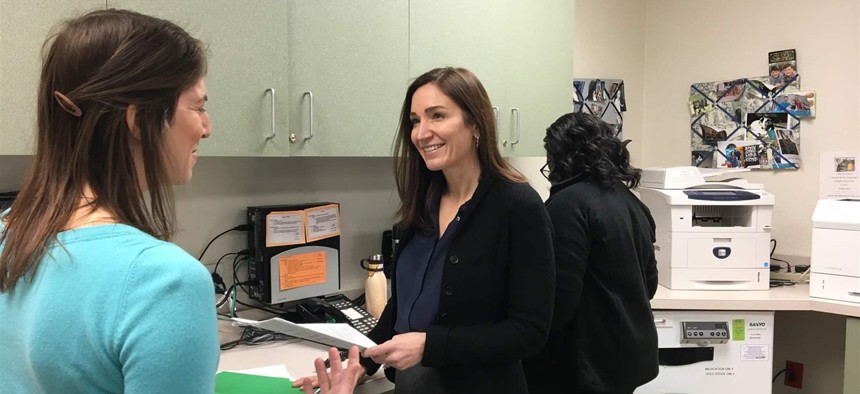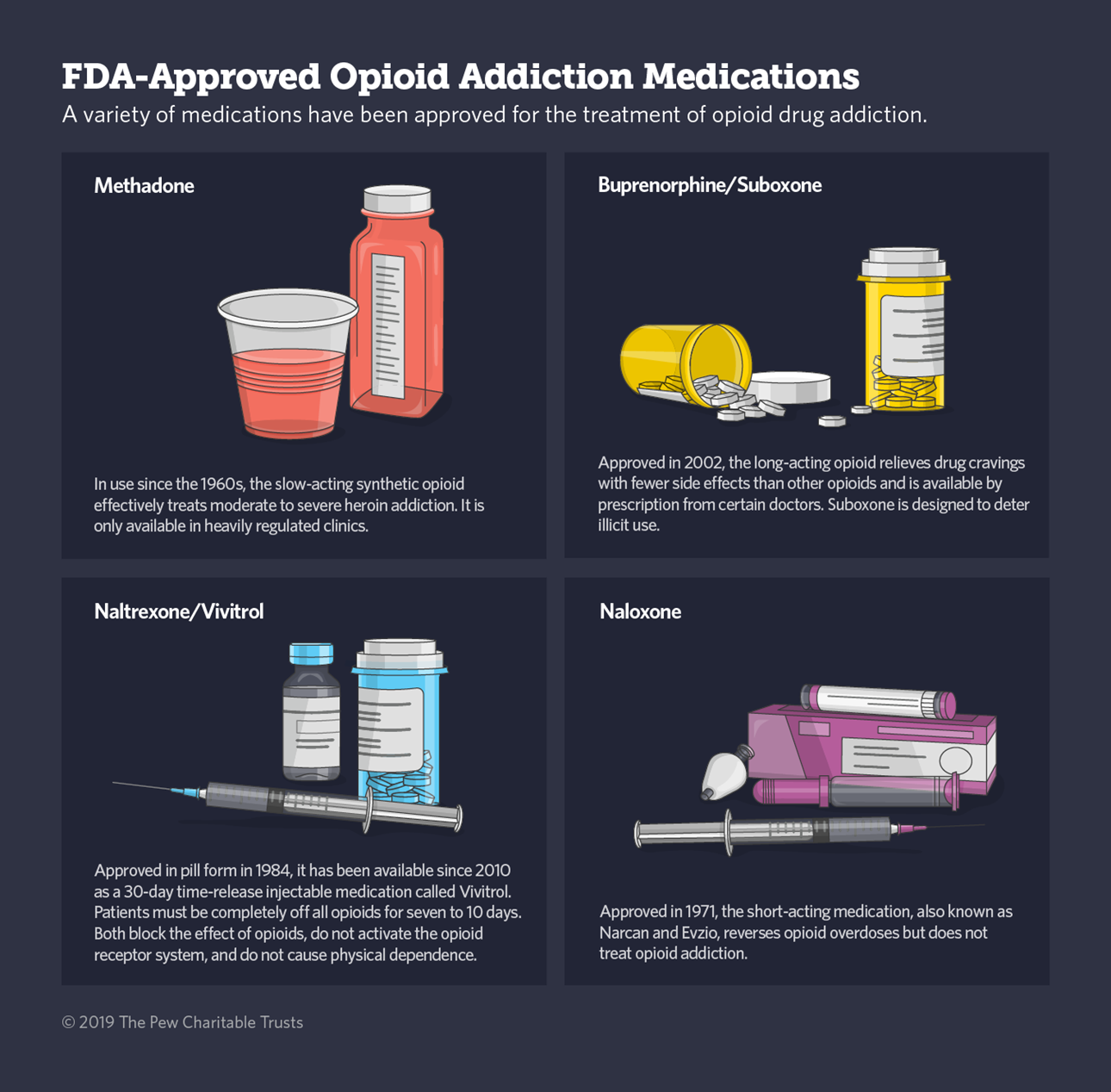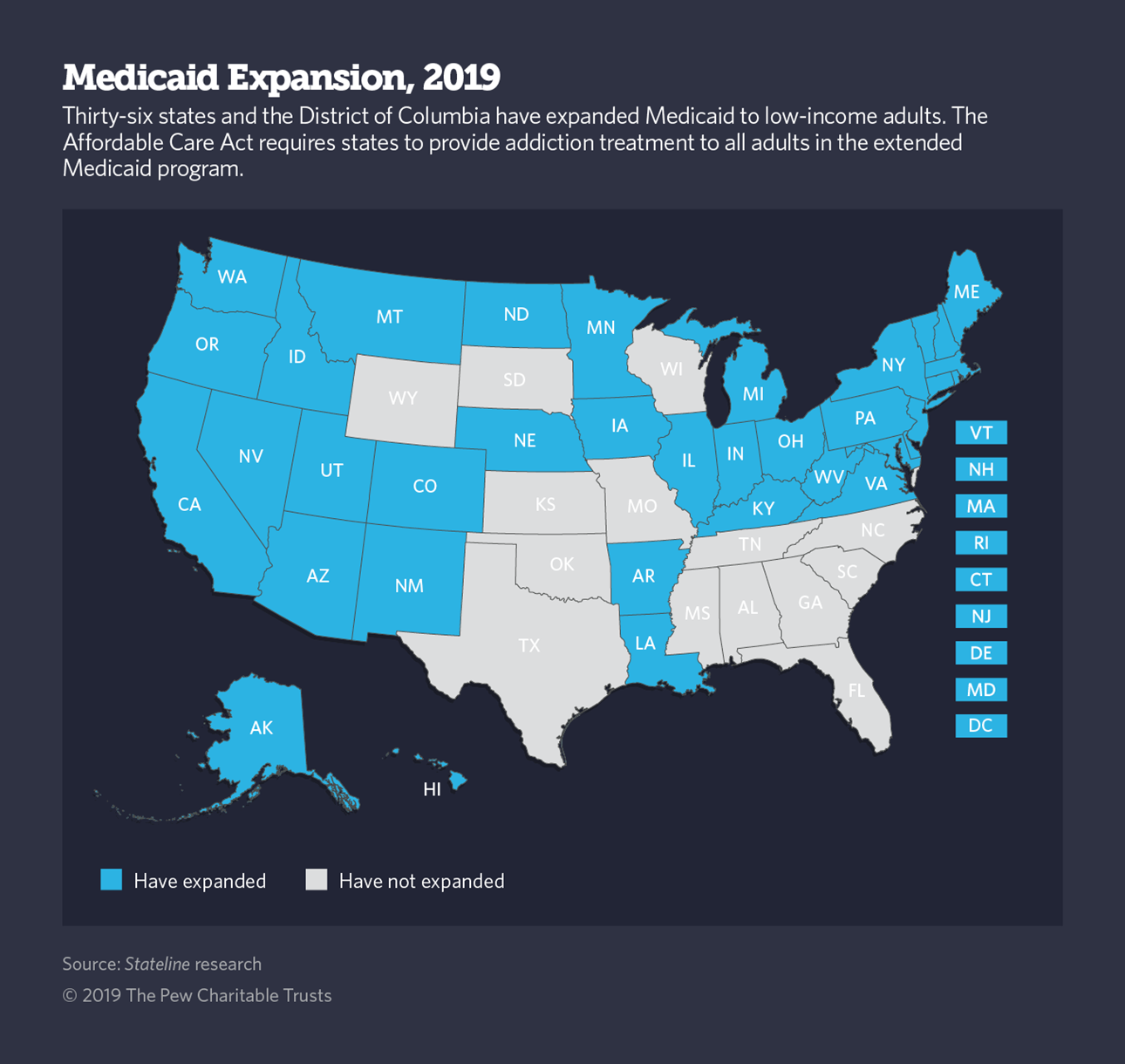Opioid Money Has Helped, But States Want More

Constance Guille and Lisa Boyars, behavioral health physicians at the Medical University of South Carolina, are leading a new telemedicine project that provides opioid addiction treatment for pregnant women across the state. The Pew Charitable Trusts
Connecting state and local government leaders
States are eyeing lawsuits against drug manufacturers or assessments against the companies as possible ways to provide more money.
This story was originally published by Stateline, an initiative of The Pew Charitable Trusts.
CHARLESTON, S.C. — Dozens of doctors, nurses and researchers here at the Medical University of South Carolina are working on new opioid treatment projects many say they never dreamed possible.
“For a small state without Medicaid expansion to mobilize opioid treatment programs and reach as many people as we have is truly amazing,” said Dr. Kelly Barth, a physician and associate professor of behavioral medicine. “We know we’re saving lives every day.”
More than a decade into an opioid overdose epidemic that’s costing the nation at least $78 billion a year, emergency federal dollars have kindled local victories. But state and local officials say they need sustainable funding for what they expect to be a long-term struggle to provide effective treatment for legions of people addicted to opioids.
Many officials are counting on settlements in civil cases against the drugmakers and distributors that state and local governments blame for the epidemic. Other states are considering an annual assessment against drug companies or a tax on painkillers.
In the meantime, frontline practitioners in the opioid epidemic say that the infusion of federal money over the past two years, and the possibility of as much as $8 billion more over the next five years under a law enacted in October, has saved thousands of lives and is starting to change the hearts and minds of traditional addiction treatment providers who have long opposed the use of evidence-based medications to treat addiction.
But to continue prevention and overdose rescue efforts, while ensuring that opioid addiction treatment is available to the 2 million Americans who need it, states will require a steady stream of funding that most state officials say they can’t count on the federal government to deliver.
And as new federal money makes it possible for more people to start treatment for drug addiction—which is a chronic disease involving relapse—the number of people who will need lifelong addiction services is steadily rising.
“Unless we can find other ways to keep funding these programs, the bottom is going to fall out for some people,” said Dr. Kathleen Brady, an addiction psychiatrist who heads state medication-assisted treatment efforts at the Medical University of South Carolina.
“One thing we’re hoping will happen,” she said, “is that enough people who receive treatment will be able to get back to work and get insurance coverage somehow.”
Without expanding Medicaid to more low-income residents, which in South Carolina is not considered likely anytime soon, she said, “we have few options for replacing those funds when we hit that fiscal cliff.”
Emergency Funding
So far, two sweeping federal opioid laws have resulted in roughly $2 billion in grants to states. But if Congress fails to appropriate some or all of the funding approved under last year’s law, emergency federal funding could dry up.
To fill the void, more than a dozen states have tried for the past three years to enact a special tax on opioid painkillers. But the measures failed in every state except New York, primarily because of lobbying by drug companies. There, a federal judge struck down the measure in December, saying it interfered with interstate commerce.
The New York bill would have assessed a $100 million tax on drug companies every year for six years and prohibited the companies from passing on the tax costs to consumers.
This year, lawmakers in California and New York have said they plan to write new legislation that would assess a fee on opioid makers and distributors to cover what they argue is the additional cost of treating those who become addicted to the painkillers.
But enacting those laws likely will prove difficult since opioid makers maintain that the taxes could jeopardize the availability of the medications for pain patients who legitimately need them.
In January, Republican Massachusetts Gov. Charlie Baker proposed a 15 percent tax on opioid painkillers that, if approved by the legislature, could generate more than $14 million a year for preventing and treating addiction to opioids.
Most states, and hundreds of cities, counties and Native American tribes, are banking on hefty settlements from drug companies in a sprawling series of civil lawsuits that will be tried in state and federal courts this year.
The first trial, scheduled to begin May 28, will hear arguments from the state of Oklahoma demanding damages from Purdue Pharma, Johnson & Johnson, Allergan, Janssen Pharmaceuticals, Teva Pharmaceuticals, and several of their subsidiaries for causing a rash of opioid overdoses in the state.

States also are tweaking their Medicaid rules to allow the federal-state health program to reimburse providers for the three medications—methadone, buprenorphine and naltrexone or Vivitrol—that have been approved by the U.S. Food and Drug Administration.
Research shows those medications are most effective at keeping people in recovery. A fourth drug, naloxone, or Narcan, is approved in the use of overdose rescue.
In the 36 states and the District of Columbia that expanded Medicaid to low-income adults under the Affordable Care Act, the health plan paid at least $930 million just for addiction medications in 2016, 30 percent more than in 2015, according to an analysis by the Urban Institute, a Washington, D.C.-based think tank.
But for South Carolina and the 13 other states that did not expand Medicaid to cover low-income adults, the program pays for addiction treatment only if the patient is pregnant or disabled.
In South Carolina, 30 percent of low-income adults are not enrolled in Medicaid and have no other insurance coverage. Of that group, 1.5 percent are likely to have an opioid use disorder.

An end to the federal opioid money that only recently started flowing could leave thousands of people in treatment with no way to pay.
Nationwide, about 2 million people are addicted to opioid painkillers or heroin.
Of those, about 17 percent, or 340,000, are uninsured, according to the Kaiser Family Foundation, which analyzes Medicaid and private insurance data.
Most states spend federal opioid money primarily on outpatient medication-assisted treatment.
But in the 36 states with Medicaid expansion and relatively high rates of insurance coverage, a larger share of the money tends to support services for people in recovery, including temporary housing and job training, according to Brendan Saloner, a health policy researcher at Johns Hopkins University.
States also are spending emergency opioid dollars on prevention, including prescription drug monitoring, education and outreach, as well as overdose rescue.
Saving Lives
At the Medical University of South Carolina, three new programs designed to expand access to effective treatment for opioid addiction were funded in part with allotments from the more than $27 million in federal grants the state received in 2017 and 2018.
For South Carolina, the new funds amounted to a roughly 50 percent increase in available federal dollars for addiction services for the uninsured.
In 2017, that meant treatment for nearly 7,000 South Carolina patients with an opioid addiction, about a thousand more than in 2016. By 2018, the state was providing treatment for an additional 3,600 addiction patients.
The new programs—including addiction treatment tailored to pregnant women, access to medication-assisted treatment in hospital emergency departments, and training and support for primary care doctors who want to help more patients with opioid addiction—already have helped hundreds of people turn their lives around and get back to work, Barth said.
Jasmine Mizell is one of them. At 28, struggling with addiction to opioid pain relievers and pregnant with her second child, Mizell said her local doctor advised her to go to Charleston and sign up for the university’s addiction treatment program for pregnant and postpartum women. She said there’s no question the program saved her life.
“If it weren’t for them, I would have lost my kids and everything else,” she said in a Stateline interview. “They didn’t treat me like some drug addict. They treated me like someone they wanted to help.”
And because the university’s pregnancy program uses telemedicine to care for its patients after an initial in-person visit, Mizell avoided what would have been a weekly six-hour drive to and from Charleston during her pregnancy.
Measuring Progress
According to a Kaiser analysis, Medicaid in 2014 paid 21 percent of U.S. addiction treatment costs, private insurance paid 18 percent, and Medicare and federal block grants paid 22 percent. The balance was paid for by state and local funding, or by patients out of pocket.
As the opioid epidemic worsened, more states adjusted their Medicaid rules to ensure that addiction medications, along with evidence-based therapy, were paid for. Medicaid expenditures for opioid treatment grew by 19 percent a year between 2011 and 2016, researchers at the Urban Institute found.
According to Daniel Polsky, a health management professor at the University of Pennsylvania, commercial insurers also stepped up to pay for more opioid treatment medications and therapy during the same period.
“It’s in insurers’ interest to cover addiction medications, and it’s in the patients’ interest too,” Polsky said. “It’s the cheapest and most effective treatment available.”
With increased insurance coverage, the number of people receiving specialized addiction treatment has grown in the last decade. The most recent annual survey of drug use and treatment conducted by the Substance Abuse and Mental Health Services Administration indicates that 600,000 people received treatment for an opioid use disorder in 2017, up nearly a third from 2016.
Still, the percentage of people with an opioid addiction who receive evidence-based treatment has remained lower than for any other chronic diseases, according to the agency. Only 1 in 5 people with an addiction to painkillers or illicit opioids receives evidence-based treatment.

Mizell said she thinks discrimination against people addicted to opioids and other substances, and the widespread bias against the use of medications to treat opioid addiction, is starting to break down in South Carolina. “I really think things are changing.”
In the past, Mizell took buprenorphine for an addiction to pain relievers off and on for more than a decade. And she said doctors, her parents and others made her feel that her daily dose of buprenorphine was “just trading one drug for another.”
But since her treatment at Medical University of South Carolina during her pregnancy, she said, she’s convinced she needs to stay on the medication for as long as necessary.
“Before, I didn’t have anything to live for. Now, I have too much to lose to go back to drugs,” she said. “I’m a recovering addict, and I’m proud of what I’ve done. I’m proud I’m taking the medicine I need.”
After her son Grayson was born in August, Mizell, now 29, opened her own consignment shop in Bennettsville. “I tell people who say, ‘I can’t pay, I’m on drugs,’ that they shouldn’t feel ashamed to ask for help,” she said. Treatment can work, she tells them. “It’s just a matter of finding the treatment that’s right for you."
Editor’s note: If you or a family member need help because of a mental or substance use disorder, call 1-800-662-HELP (4357) or visit the Substance Abuse and Mental Health Services Administration’s website at findtreatment.samhsa.gov.

NEXT STORY: Kentucky Governor: Cold Weather Closures Set Bad Example for Kids


